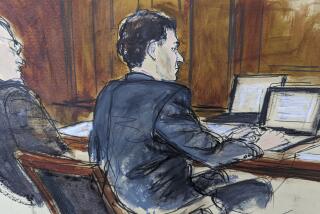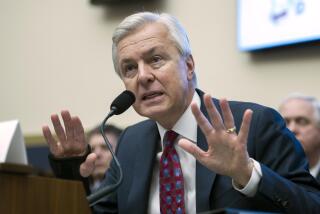Witness Says Enron Raided Fund
- Share via
HOUSTON — Enron Corp. illicitly tapped into accounting reserves to inflate earnings demanded by former Chief Executive Jeffrey K. Skilling to impress Wall Street, a former top accountant testified Monday as the fifth week of the trial of Skilling and former Enron Chairman Kenneth L. Lay got underway.
The accountant, Wesley Colwell, testified that the orders from his bosses to raid the reserve funds violated accounting rules that govern how companies report expected costs and liabilities.
“If you have [transfers] that are driven by a desire to increase earnings, it is improper,” said Colwell, who was the head accountant of Enron’s North American trading business.
Lay and Skilling are on trial on conspiracy and fraud charges linked to the 2001 collapse of the company that was once the darling of Wall Street.
Enron plunged into bankruptcy in December 2001 after its use of off-balance-sheet partnerships to hide billions of dollars in debt and bolster profit was discovered.
Colwell paid $500,000 in 2003 to settle a civil case brought against him by the Securities and Exchange Commission. He has not been charged with a crime and is cooperating with the government under a deal that allows him to avoid prosecution.
Colwell said he was told twice by former chief accountant Richard Causey in July 2000 to dip into a reserve of $70 million created to account for the expected cost of an electricity deal with the Tennessee Valley Authority.
Colwell reduced that reserve by $14 million, increasing profits and allowing Enron to boost earnings per share by 2 cents. The results beat financial analysts’ forecasts for the quarter.
Causey had been set to go on trial with Lay and Skilling, but he reached a plea deal with prosecutors in December that was expected to send him to prison for seven years.
Later, in preparing the fourth-quarter earnings totals, Colwell said, the company did not even total up its reserves until after Causey told him how much money from those accounts would be needed to meet profit goals.
“He said to me that he had to talk to Jeff Skilling about where he wanted to land the quarter,” Colwell said.
Skilling’s lawyer, Randall Oppenheimer, sought to portray the moves as legitimate because reserve amounts are often revised. Enron had booked reserves that were too high for other liabilities, Oppenheimer said, so reducing the reserve for the power deal simply offset those excessive estimates.
But Colwell disagreed, saying each reserve was separate and needed to be determined by its own factors, not by profit goals.
After Colwell’s testimony, prosecutors called Wanda Curry, a former Enron accountant who testified she was moved into another job because she was not willing to use aggressive accounting interpretations the company wanted.
Also Monday, a federal judge ruled that the retrial of two former executives of Enron’s Internet unit could begin May 1 in a courtroom adjacent to where the Lay-Skilling trial was being held.
Ex-Enron Broadband Services accountant Michael Krautz, 37, and former finance Vice President Kevin Howard, 43, were tried in July on conspiracy and fraud charges.
Prosecutors accused them of scheming to inflate earnings by falsely booking revenue from a failed venture to distribute movies on the Internet. They were tried with three other former executives.
After 12 weeks of testimony and four days of deliberations, jurors in Houston deadlocked and returned a patchwork of acquittals and mistrials. No verdicts were returned for Krautz or Howard. Defense lawyers for the two men say the publicity generated by the main Enron trial may hurt their clients.
More to Read
Inside the business of entertainment
The Wide Shot brings you news, analysis and insights on everything from streaming wars to production — and what it all means for the future.
You may occasionally receive promotional content from the Los Angeles Times.









